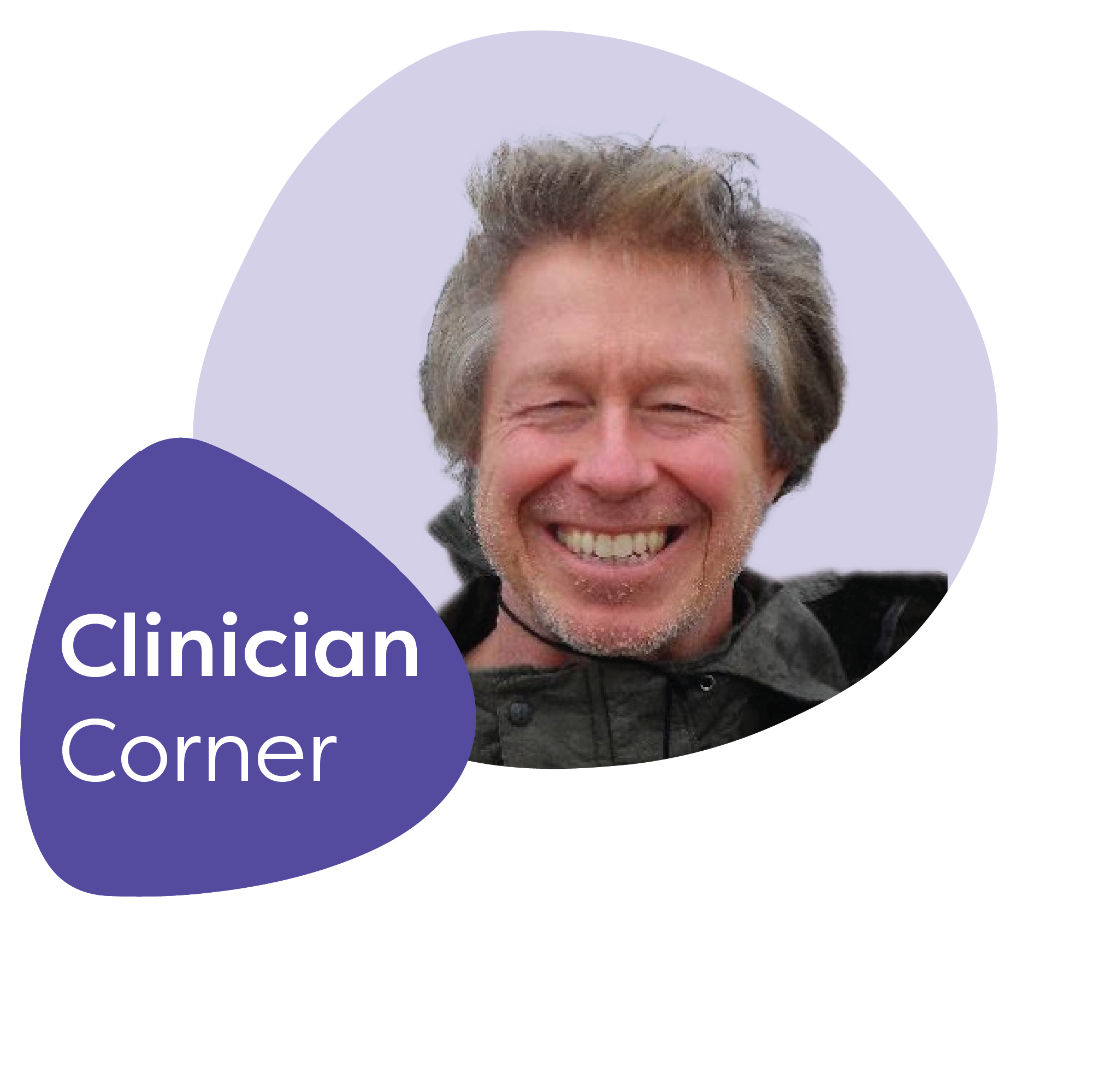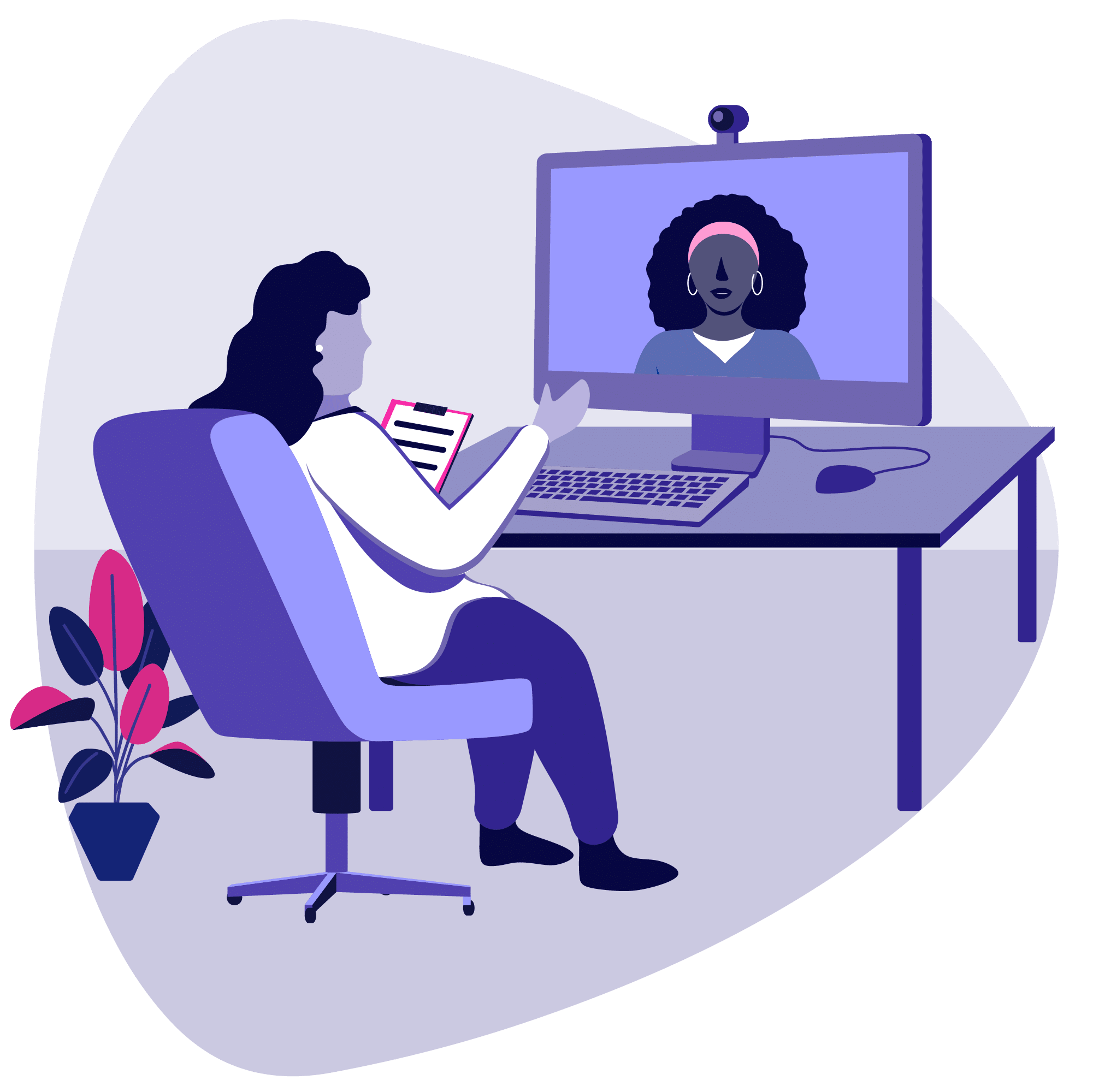Iris clinicians are at the heart of what makes our organization such a special place to work. That’s why we’re turning the spotlight on the amazing work they’re doing every day. This month, we’re sitting down to talk with Dr. Paul Vance.
Q. How did you find Iris and decide you wanted to be an Iris provider?
A: I worked in a community mental health center for about a dozen years, and in 2016 I decided to move to the West coast with my family. My daughter just graduated high school. I loved the job I came from, but I didn’t like the job that I went to in Oregon. We’d already purchased a house, and at that point, you’re stuck. I looked around and found Iris. I’d had a great job for about 12 years and then a not-so-great job for 18 months. I didn’t look at Iris as “I hope they hire me.” I looked at Iris instead, asking, “am I going to work there, and will I enjoy it?”
I had a great interview and then looked on the internet about what other providers were saying about Iris, and it was positive. I initially joined Iris thinking I would do it until I found something else I liked, but I rapidly fell in love with Iris and haven’t looked elsewhere.
Q. How does telepsychiatry compare to in-person work?
A: I’m working at a community mental health center in Mississippi, and before, I worked at a community mental health center in person. The jobs are very similar to each other. The difference is, safety-wise, my wife is a lot happier where I’m working now. In 12 years, I’d taken a gun from a patient who pointed one at me, a box cutter, and a set of knives. I did a lot of state hospital step-downs and court-ordered treatment, and many times people weren’t very happy with you when you’re doing that. I don’t have that problem now. I don’t have to worry about someone following me home or knowing where my kids are going to grade school.
That’s a big difference. It’s just simply safer from that point of view. The other part that’s different from it is you have a lot more time. I walk into work at 8:50 or 8:55. Before it would’ve been 8:15, I would’ve left the house. I probably wouldn’t have gone to the gym before work because it was too long to drive. Then you have to shower. Time-wise, you may work the same number of hours, but you save several hours per day just simply not doing the stuff you did when driving someplace. As far as working with nurses and patients, you all forget that you’re on a computer. I send pictures to the nurses of my dogs. They send me pictures of their kids. It goes back and forth. It’s about the same as what it is when you work in an office.
Q. How do you foster connection with patients virtually?
A: I think fostering a connection virtually is easier. That may be due to the patient load I like treating. I like treating people with severe mental illnesses like schizophrenia and severe bipolar disorder. These patients are often more comfortable because you’re not in the room. They like the idea that they’re by themselves. You’re not going to see them in the community. I was quite surprised by that. But, often, it’s just simply easier, and that goes for patients without severe mental illness, too. Quite a few patients are more comfortable talking to you when you’re not there rather than if you’re actually in the room with them.
That means sometimes giving you personal information they might be more uncomfortable giving. For example, I think it’s easier for someone to say, “I do methamphetamines” and “I drank a lot of alcohol,” if you’re not there. I think it’s surprising for me. At first, I thought it would be difficult to connect, and it’s actually far easier.
Q. As a healthcare professional, how do you manage work-life balance?
A: I helped lead a lot of other physicians when I worked at the community mental health center. One thing is you have to have interests that don’t have anything to do with being a physician. I’ve been married for a long time. We have a freezer full of mushrooms that we pick from the woods. We do a lot of gardening. We forage for plants. We hike our dogs. We’ve coached soccer, cross country, and track. I’ve helped a couple of teams win state championships. It’s more about having an interest that you’re simply interested in. That way, when you finish work, you don’t sit down and veg out but are excited to do something else. That’s part of it.
And then the other part I’ve seen this with virtual physicians and then in-person physicians is, if you’re not organized, if you don’t finish your notes quickly, and practice writing notes well, what happens is you’ll see many physicians spend several hours after they finish work on notes. That doesn’t have anything to do with the computer, but that drains you.
I always make sure my notes are done before taking a break at lunch. Before I finish work at the end of the day, I’m done. And usually, if the work shift ends at five o’clock, I’m walking out the door by 5:05. Organization comes with it.
The last one is what I always tell patients. You should treat yourself as well as you treat your dog. Feed it well. Walk it every day. Get it up on time. Make it go to bed on time. Just live a healthy life, which helps you have an outside interest.
Q. What is the most rewarding part of your job?
A: I like seeing people get better. When I entered medicine, I figured out pretty quickly that a lot of the specialties I simply did not want to do because they were focused on treating disease. I see people with severe mental illness, but that’s just a part of who they are. My big focus is I want you to live a healthier life. I want you to be better with your kids. I want you to be better with your community. I want you to get out and move. And when you see patients do that, to me, that’s the most rewarding part.
Q. What do you love about working with Iris?
A: Iris is pretty responsive. That was kind of scary at first because I could say, “Hey, I’m having an issue,” and somebody would call me within about three minutes. I wasn’t used to that. They’re interested in ensuring you’re happy, the clinic is happy, and everything is running smoothly. I was used to working in the community mental health center, where you have to throw a fit to get your computer fixed. That hasn’t happened with Iris. It just simply happens. I say, “I’ve got a problem,” and they fix it.
Q. Why do you think telepsychiatry is important to the future of mental healthcare?
A: It’s already happened that way for the most part. If you’re in a rural community or live in an inner city, you will only get mental health care if you have a psychiatrist that’s being remoted in. I work in two towns in northern Mississippi, and their nearest physician is in Memphis. I think it’s an hour and a half away. They’re not going to do that. Many people don’t have cars; if they do, they can’t make an hour and a half drive. I grew up in a small town of 1,500. We never had a physician in the town. You never went to the doctor because the nearest physician was an hour away, and I grew up on a farm. That didn’t happen. Everybody’s moving to the cities, and those inner cities will need care, and telemedicine is the only way it will be provided. Then the rural communities are the same. For the people who are deciding to stay there, telemedicine is the only way they’re going to get care.
Q. What advice would you give to someone new to telepsychiatry?
A: The big advice I would give is very practical. I have three screens. I look at the patient on one screen, and I have a second screen off to the left and a third screen off to the right. That’s the smallest advice you could give, but having an adequate screen, a keyboard that works, a mouse that you know, where it is, and having your printer where you can reach it, are crucial. I’ve talked to one other psychiatrist doing virtual, and I could see them looking at me because they were close to the screen, which meant I knew they had a small screen. That doesn’t work. The best thing is to organize your workspace, which is different from seeing a patient in person.
I wouldn’t even have the screen if I saw a patient in person. I wouldn’t even have a computer or a keyboard sitting in front of them. That part’s different. Office organization is the most important thing. Then, the other which I did with both sites is do whatever you need to do to have the site you’re working with allow you to access their medical record before you start working. Those two are practical.
On the flip side, it’s far easier to be organized in telepsychiatry than in person. You don’t have charts that you’re fooling around with. When you close the record out, it’s closed. That part makes it easy. You can take notes on the desk on the paper beside you if you need to. That part is easier, but it’s really not good if you’re not organized.
Q. What are some benefits you’ve found from working remotely?
A: I entered the relationship with Iris reluctantly. I was looking desperately to keep my house and still be able to work and not move. The only thing I would’ve done differently is I would’ve probably looked for Iris several years earlier. I can’t believe the lifestyle change in a very positive way. I hike every single day. I missed one day the last year in the national forest.
I moved from Oregon to Kentucky while working for Iris. Four years ago, when I moved from Kentucky to Oregon, I had to change jobs. I had to make sure all kinds of things were just done. When I moved from Oregon to Kentucky, I was still employed with Iris. It was simply a matter of taking a week’s vacation and plugging myself into a new room. That was such a lifesaver. It was unreal as far as timewise, money, and everything else. We may move again, but it’s easy when you’re not changing work.
At Iris, we believe our providers should be respected, valued, and applauded for the work they do, and we couldn’t be more proud to say, “thank you” to our very own Dr. Vance. If you’d like to learn more about working for Iris Telehealth, contact us today.



